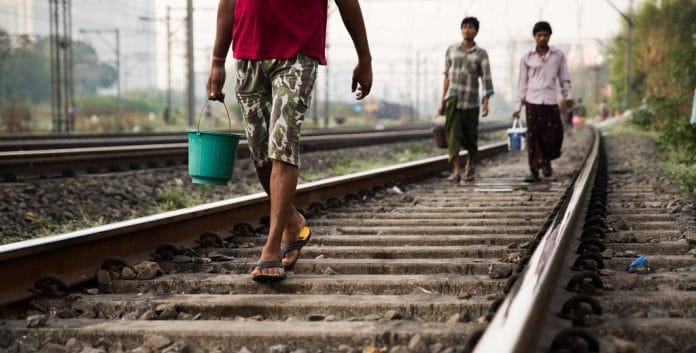The CAG report, tabled in Gujarat assembly, shows nearly 30% of the households in 120 gram panchayats do not have toilets.
New Delhi: The BJP-led Central government may have declared PM Narendra Modi’s home state Gujarat open defecation-free (ODF), but a Comptroller and Auditor General (CAG) report tells a different story.
According to the report, tabled in the state assembly Wednesday, nearly 30 per cent of the households in the 120 gram panchayats studied do not have toilets.
“The state government declared all the districts of Gujarat as ODF by October 2, 2017. However, information provided by 120 test-checked gram panchayats under eight selected district panchayats for the period of 2014-17 revealed that 29 per cent households still did not have access to toilets (individual or public),” the report says.
Also read: PM Modi writes to media houses to participate in ‘clean India movement’
In February, the Central government had declared Gujarat, along with 10 other states, open defecation-free under PM Modi’s pet project Swachh Bharat Mission (SBM).
“The claim of the state government that all the districts of Gujarat were ODF does not appear to be correct,” the CAG report adds.
Old data and excuses
According to the report, the government had claimed Gujarat was an ODF state based on data from a baseline survey conducted in 2012. “However, this list was not updated after 2012 and, therefore, a number of households did not have any access to toilets and they remained uncovered,” the report says.
This issue was brought up with the Gujarat government in March 2018, and the authorities responded by claiming that more toilets were built later “through CSR (corporate social responsibility) initiative,” thereby making the state ODF-compliant.
However, even in the places where toilets had been constructed, residents were unable to use them for a variety of reasons.
Lack of access to toilets
Of the total of 54,008 households considered in the recent CAG report, 15,728 (29.12 per cent) had no access to toilets, said the report.
In addition, in 41 out of the 120 gram panchayats considered, even the toilets built under the Swachh Bharat Mission were unusable due to faulty or missing water connections. The report points out that in 15 other villages, along with water unavailability, soak pits were also left incomplete.
The report was based on a survey conducted in eight districts — Dahod, Banaskantha, Chhotaudepur, Dang, Patan, Valsad, Jamnagar and Junagadh.
The state of sanitation in the tribal-dominated Kaprada taluka of Valsad district was reported to be particularly bad. Of the 17,646 toilets constructed under the erstwhile Nirmal Bharat Abhiyan, only 223 were functional, while a staggering 17,423 toilets were discovered to be “defunct”, said the CAG report.
However, the assistant commissioner (SBM-gramin) responded to the CAG by saying that “2,529 of 17,423 defunct toilets had been newly-constructed and put to use as of March 2018”, news agency PTI reports.
“But the government’s reply is not tenable as a significant number of households were either without toilets or not able to use it due to non-availability of water or incomplete structure,” the CAG report said.
Also read: Bangladeshis can teach Narendra Modi’s India a thing or two about using toilets
The CAG recommended that the government cover all the “individual households left out…to ensure that everyone has access to toilets”.
With inputs from PTI






